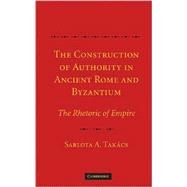
Note: Supplemental materials are not guaranteed with Rental or Used book purchases.
Purchase Benefits
Looking to rent a book? Rent The Construction of Authority in Ancient Rome and Byzantium: The Rhetoric of Empire [ISBN: 9780521878654] for the semester, quarter, and short term or search our site for other textbooks by Sarolta A. Takács. Renting a textbook can save you up to 90% from the cost of buying.
| Acknowledgments | p. ix |
| Abbreviations | p. xi |
| Maps | p. xv |
| Introduction | p. xvii |
| Repulican Rome's Rhetorical Pattern of Political Authority | p. 1 |
| Virtual Reality: To Win Fame and Practice Virtue | p. 1 |
| Creation of a Public Image: Rome's Virtuous Man | p. 4 |
| Virtue and Remembrance: The Tomb of the Scipiones | p. 16 |
| Variations on the Theme: Cicero's Virtuous Rome | p. 24 |
| Pater Patriae: Symbol of Authority and Embodiment of Tradition | p. 32 |
| The Virtuous Father: Gaius Julius Caesar | p. 36 |
| Empire of Words and Men | p. 40 |
| Augustus's Achievements: A Memory Shaped | p. 40 |
| Horace's Poem 3.2: Dulce et decorum est pro patria mori | p. 50 |
| Nero: What an Artist Dies with Me! | p. 55 |
| Vespasian: The Upstart from Reate | p. 62 |
| Trajan: Jupiter on Earth | p. 73 |
| Maximus: Hollywood's Ideal Roman | p. 77 |
| Appropriation of a Pattern | p. 81 |
| Mending the Known World Order | p. 81 |
| A New World Order | p. 89 |
| Constantine, Very Wisely, Seldom Said "No" | p. 94 |
| A Pagan's Last Stand | p. 99 |
| Augustine: The Christian Cicero | p. 107 |
| Claudian's On the Fourth Consulate of Honorius | p. 112 |
| The Power of Rhetoric | p. 119 |
| The Last Roman Emperor: Justinian | p. 119 |
| The First Byzantine Emperor: Heraclius | p. 127 |
| A View to the West: Charlemagne | p. 134 |
| Back to the East: A Theocratic State? | p. 139 |
| Conclusion | p. 147 |
| Bibliography | p. 155 |
| Ancient Authors | p. 155 |
| Modern Authors | p. 156 |
| Index | p. 165 |
| Table of Contents provided by Ingram. All Rights Reserved. |
The New copy of this book will include any supplemental materials advertised. Please check the title of the book to determine if it should include any access cards, study guides, lab manuals, CDs, etc.
The Used, Rental and eBook copies of this book are not guaranteed to include any supplemental materials. Typically, only the book itself is included. This is true even if the title states it includes any access cards, study guides, lab manuals, CDs, etc.